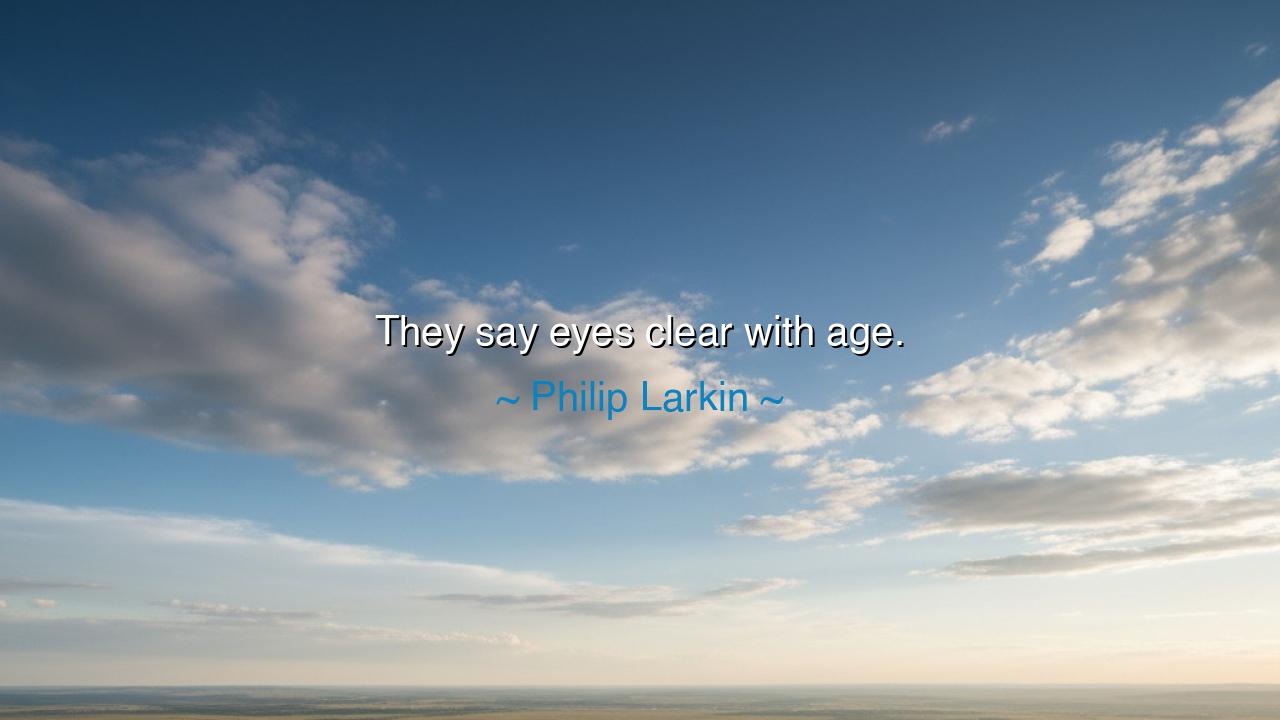
They say eyes clear with age.






In the fleeting passage of time, there comes a moment when the clouds that obscure our vision begin to part, allowing us to see more clearly. The poet Philip Larkin offers a profound reflection with the words: "They say eyes clear with age." At first, this may seem like a simple observation about the natural aging process, but it speaks to something deeper—an awakening of the spirit that comes only through experience, hardship, and the quiet unfolding of wisdom. Just as the eyes of an elder often hold a depth that youth cannot fathom, so too does the soul of the seasoned individual carry clarity that the young may seek, but cannot yet possess.
Consider the ancient Greeks, whose philosophers sought to understand the world not just through knowledge, but through lived experience. The great Socrates, in his later years, spoke of the importance of self-examination and reflection. He knew that the wisdom of age comes not from merely living longer, but from the ability to look back upon one’s own life and gain clarity about the truths that govern existence. In youth, we are often clouded by the passions and impulses that drive us, but with age comes the ability to reflect and, in turn, to see more clearly—not just the world, but ourselves.
The eyes that Larkin speaks of do not simply refer to the physical sense of sight. They are a metaphor for the way we begin to see the world as it truly is, without the distortion of youthful ambition, naïveté, or untempered emotion. It is like the tale of King Solomon, who, though young and inexperienced, prayed for the gift of wisdom. And wisdom, as it came to him, did not fill him with pride or certainty, but with the clarity to see the truth in all matters. With each decision, Solomon’s eyes—his mind, his spirit—became clearer, for he was able to view the world with the lens of compassion, understanding, and balance.
Yet, as with all things in life, clarity comes only through struggle. The clear eyes that Larkin speaks of are not simply the gift of time but the result of trials, tribulations, and the willingness to face the uncertainties of life. Nelson Mandela, imprisoned for decades, emerged from the darkness of his cell not just with a body aged and weary, but with a mind that had gained unparalleled clarity. He understood that the fight for freedom was not about hatred, but about understanding, forgiveness, and the broader vision of unity. His eyes, through years of hardship, became clear—seeing not only the world for what it was, but for what it could be.
This clarity is not just about the intellectual understanding of life’s complexities, but also about the emotional depth that grows with age. In youth, we often see only in sharp contrasts—good and evil, success and failure. But as we age, the shades of gray begin to reveal themselves. We learn that life is rarely black and white, and that our judgments must be tempered with empathy and compassion. The eyes of the elderly often reflect this understanding—a knowledge of life’s ebb and flow, its contradictions, and its fragile beauty. The philosopher Confucius, in his later years, recognized that true wisdom lay not in making judgments with haste but in understanding the deeper currents of human nature. His eyes became clearer with age, and he saw the interconnectedness of all things.
The lesson here, then, is that clarity does not come without effort. It is earned through living fully and reflecting deeply on one’s experiences. To gain the clarity that age offers, we must not shy away from life’s challenges or the difficulties that come with growth. Instead, we must lean into them, understanding that each moment of hardship, each moment of joy, adds depth to our vision and wisdom to our soul. Youth may bring strength, but it is age that brings the kind of wisdom that allows us to see beyond the surface and understand the deeper meanings of life.
In our own lives, let us embrace the idea that eyes clear with age—not simply as a passing of years, but as a result of intentional living. Let us strive to live with purpose and reflection, allowing our eyes—our inner vision—to become clearer with each experience. Wisdom, like clarity, is a gift that comes not just with time, but with the willingness to look inward and learn from the world around us. As we grow older, let us ensure that our eyes remain open, not just to the world, but to the truths within ourselves. The clearer our vision, the more we will understand the fullness of our existence and the purpose that awaits us.






AAdministratorAdministrator
Welcome, honored guests. Please leave a comment, we will respond soon